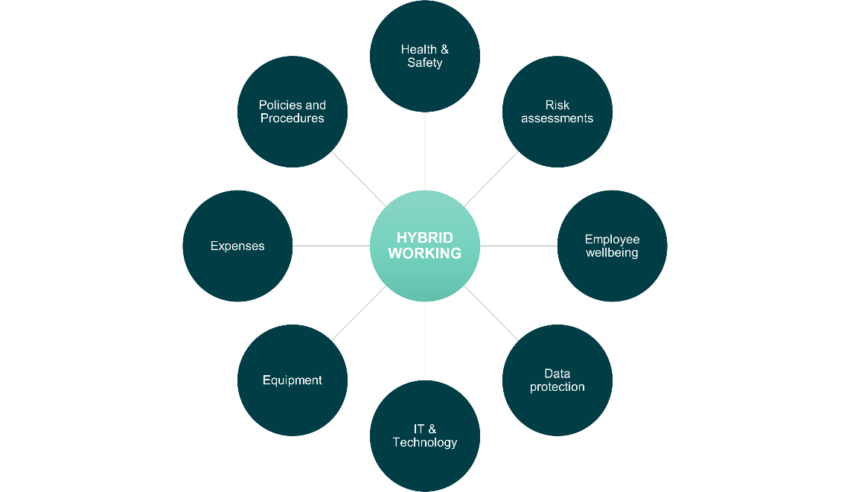This article examines the latest strategies and initiatives to support employers and employees as they return to the office following the lifting of Covid-19 restrictions.
On the 19th of July 2021, the legal instruction to work from home ended, with the Government leaving Covid-19 security measures to the discretion of individuals and employers. The Government recommended that any return to offices be gradual.
Work During Covid-19
We heard from Melanie Wilkes, Head of Research at the Work Foundation [2]. Melanie began by presenting some key statistics from the ONS [3]:
- 85% of those currently remote working, expect to combine on-site and home working in the future
- 37% of businesses expect employees to return to site by August 2021
- Job adverts referring to homeworking are three times higher than pre-pandemic
There have been many benefits of remote working reported by employees. Outlined by ACAS [4], benefits of working from home include:
- Increased productivity
- A healthier work life balance
- Increased job satisfaction
- Better staff retention
- Money saving on rent for office premises
Additionally, it is essential to learn lessons from this period of home working. Luann Donald, Senior Workforce Adviser at the Local Government Association discusses how we now know the pivotal role of the line manager. Communication and team cohesion was compromised because of remote working due to diminished control from managers.
However, the pandemic has proven that we can in fact be remote in our work and it is possible to be productive and flexible in this work style.
Widening Opportunities for Hybrid Working Post Covid-19
Shabana Muneer, Director of Walker Morris [6] explains that hybrid working would offer employers office space for those who want to use it, whilst allowing employees to work from home for some of the weeks. Employees may be expected to spend a certain amount of time in the office with mandatory attendance for certain events or training days.
Shabana displays the factors that must be considered when allowing hybrid working:

Furthermore, Luann Donald raises the challenges associated with hybrid working. The employer must consider ways to create a working culture that inspires collaboration, communication, and connections between all staff, whether they are at home or in the office.
Employers must manage inclusion and fairness when transitioning to hybrid working, particularly for new or more inexperienced employees.
Some proposed solutions to the needs associated with the hybrid workplace:

[5] Proposed solutions to fulfil the needs of the hybrid workplace
Luann provides an example of the Local Government Associations plan to introduce hybrid working in local government which considers several of these factors:
- Hybrid working in local government will be about location, but also about the structure of work, communications, hours, and be a system that supports staff to be as productive as possible no matter where, when or who they work with
- It must be built around some key considerations that balance the needs of the councils, the staff, and the community that the council serve
- The new hybrid working routine must be focused on the outcomes for the served community
- It must encourage innovation in its services
- It must happen alongside digital transformation
Benefits of Hybrid Working to the Future of Work
Luann highlights that hybrid working will provide more flexible working options for all staff. In turn, workplaces will become more employee-centric and collaboration focused.
Working cultures will become more agile. Managers may develop a more compassionate management style because of considering the diverse set of needs their team will display when offered hybrid working.
Additionally, Jane van Zyl, Chief Executive of Working Families emphasises the ways that hybrid working will benefit employees with family responsibilities [7]:
- There are 13 million working parents in the UK, more than a third of the workforce [3]
- 7 in 10 of working parents consider their childcare needs before applying for a new job or promotion
- 54,000 pregnant women and new mothers lose their jobs each year because of maternity discrimination
Therefore, hybrid working structures will give working parents more freedom to work to the highest standard, equipped with the knowledge that they can be flexible in their work patterns.
Recommendations from The Health and Safety Executive
It is, of course, essential that workplaces ensure that their offices minimise the risk of an outbreak as much as possible. Shuna Rank, Inspector of Health and Safety at the HSE recommends how workplaces should carry out a risk assessment of their working environments [8]:
- Identify what work activity or situations might cause transmission of the virus
- Think about who could be at risk (e.g., vulnerable staff)
- Decide how likely it is that someone could be exposed to infection
- Act to remove the activity or situation, or if not possible, control the risk
- Consider ways to implement adequate handwashing facilities and provide information on how to wash hands properly
- Ensure that frequently touched surfaces are identified and regularly cleaned
- Do not ignore the legal obligation to ensure adequate supply of fresh air in enclosed areas through ventilation
- Monitor and review – update as required
Additionally, Shuna recommends keeping an open dialogue with workers. Consulting workers ensures that they are aware of Covid secure arrangements. It also allows workers to voice concerns and make suggestions as to how to further improve the safety of the workplace.
[1] CIPD, Professional Body for HR and People Development. 2021. Managing Remote Working
[2] Wilkes, Melanie. 2021. Head of Research at the Work Foundation
[3] The Office for National Statistics. 2021/ Statistics on homeworking
[4] Acas. 2021. Agreeing Working from Home Arrangements
[5] Donald Luann. 2021. Senior Workforce Adviser at the Local Government Association
[6] Muneer, Shabana. 2021. Director of Walker Morris
[7] van Zyl, Jane. 2021. Chief Executive of Working Families
[8] Rank, Shuna. 2021. Inspector of Health and Safety at the HSE
Register FREE to access 2 more articles
We hope you’ve enjoyed your first article on GE Insights. To access 2 more articles for free, register now to join the Government Events community.
(Use discount code CPWR50)




